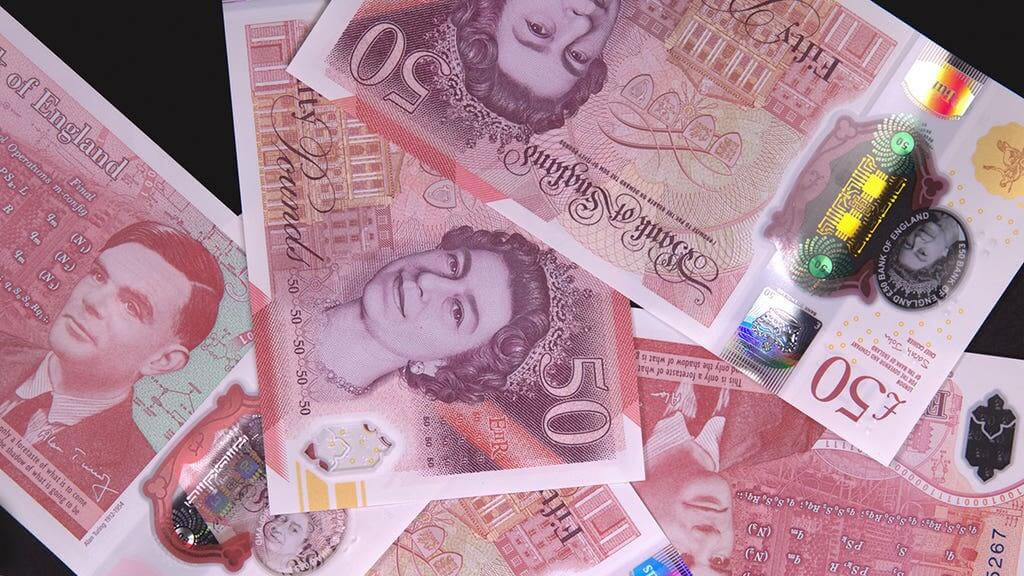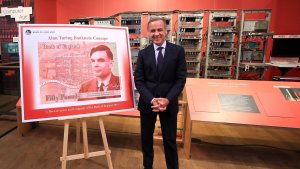Alan Turing: An Exceptional Man With A Brilliant Mind
The scientist was a wartime hero who played a key role in cracking the Enigma code.

Alan Turing was a wartime hero whose later life was overshadowed by a conviction for homosexual activity, which was later considered unjust and discriminatory.
From June 23, people will start to see the new £50 featuring his image as the notes enter general circulation.
Often considered to be the father of computer science, Mr Turing studied mathematics at King’s College, University of Cambridge.
In 1936 his work On Computable Numbers was seen as giving birth to the idea of how computers could operate.
His “Turing test” also examined the behaviour necessary for a machine to be considered intelligent – the foundation for artificial intelligence.

Mr Turing played a key role in cracking the Enigma code, which, it has been said, helped to shorten the Second World War by at least two years and saved millions of lives.
The Enigma enciphering machine, adopted by the German armed forces to send messages securely, was believed to be unbreakable as the cipher changed continuously.
Mr Turing was part of an Enigma research section, which worked in the stable yard at Bletchley Park.
The first wartime Enigma messages were broken in January 1940 and Enigma traffic continued to be broken routinely at Bletchley Park for the remainder of the war.
Mr Turing was later convicted of gross indecency for his relationship with a man.
His conviction led to the removal of his security clearance and meant he was no longer able to work for Government Communications Headquarters (GCHQ) where he had continued to work following service at Bletchley Park during the war.
Andrew Bailey unveils the new £50 note, and is joined by actor and writer Stephen Fry @stephenfry and scientist Dr Simon Singh. In this video they each explain why Alan Turing is such an inspirational figure to them. https://t.co/hoj6xsUkLE #TheNew50
— Bank of England (@bankofengland) March 25, 2021
He was chemically castrated following his conviction in 1952 and died in 1954 at the age of 41.
Mr Turing died of cyanide poisoning and an inquest recorded a verdict of suicide, although his mother and others maintained his death was accidental.
He was later given a posthumous royal pardon, following a request from then-justice secretary Chris Grayling.
“Dr Alan Turing was an exceptional man with a brilliant mind,” Mr Grayling said previously.
In September 2009, then-prime minister Gordon Brown apologised to Mr Turing for prosecuting him as a homosexual, after a petition calling for such a move.
An e-petition, Grant A Pardon To Alan Turing, had previously received 37,404 signatures.
James Turing, a great-nephew of Alan Turing, described the Bank of England’s new £50 note design as “an unbelievable honour” for his family.
Mr Turing, who runs the Turing Trust which refurbishes UK computers for use in African schools, told the BBC Radio 4 Today programme: “It is quite an unbelievable honour.
“It certainly highlights the enormity of Alan’s legacy, which hopefully we are doing something through the Turing Trust that he would be proud of in continuing to further enable access to a digital world.”
He added: “It’s been quite strange for me growing up – no-one knew who Turing was really, and then over the last 10 to 20 years, particularly with the film coming out – The Imitation Game – there seems to have been a lot more national recognition, particularly as the secrets of Bletchley Park have been revealed.
“It’s been quite a journey as Alan’s star continues to rise, which is wonderful for us.”
Thanks for signing up to Minutehack alerts.
Brilliant editorials heading your way soon.
Okay, Thanks!
